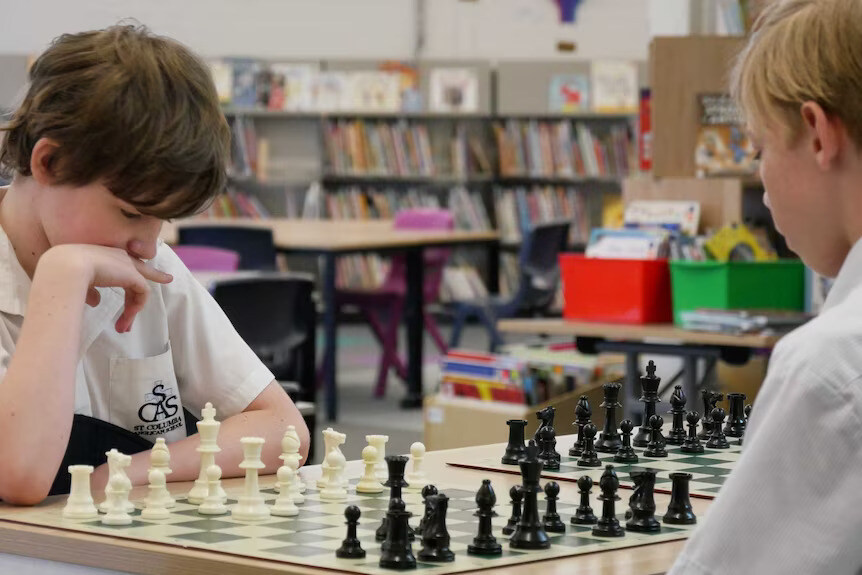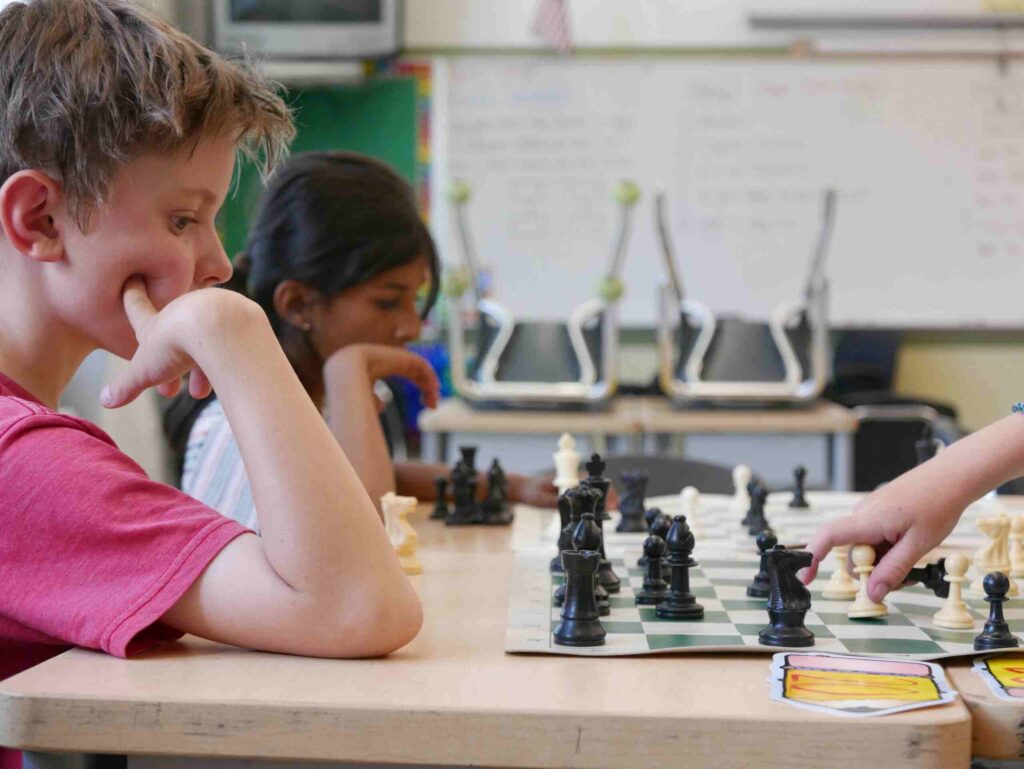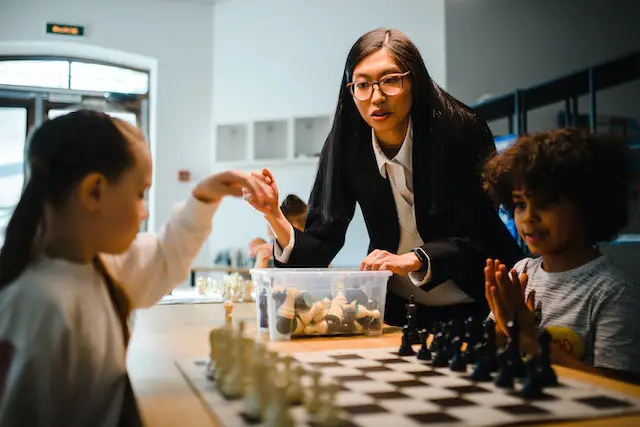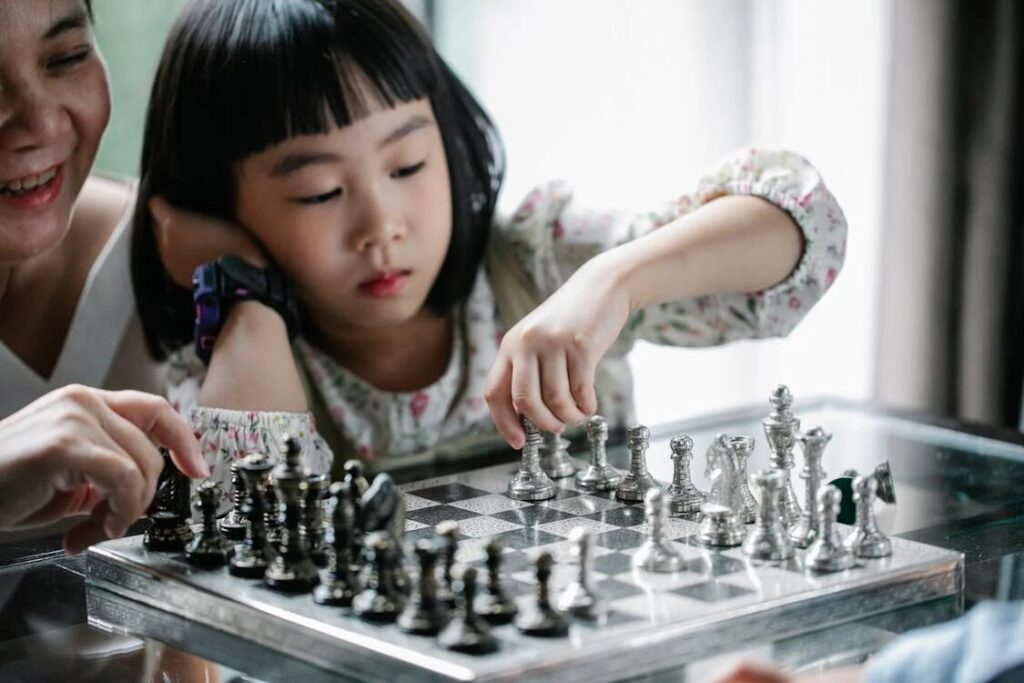When you think about teaching kids problem-solving, what comes to mind? Puzzles? Math problems? What if I told you that chess, a simple board game with black and white pieces, is one of the best ways to help kids become better problem solvers? Chess isn’t just about moving pieces on a board; it’s a game that teaches planning, strategy, and patience. Kids who play chess regularly develop critical thinking skills that help them handle challenges both on and off the board.
Chess Encourages Thinking Before Acting
One of the first lessons kids learn in chess is to think before they act. Unlike many other games, where the action happens quickly, chess requires players to pause and consider their options.
Every move can have consequences, so players must think ahead and plan their strategy.
For example, a kid playing chess might want to move their queen to capture an opponent’s knight. But before making that move, they need to ask themselves, “What will my opponent do next?”
They might realize that moving the queen would leave their king vulnerable. This thought process forces kids to slow down, think carefully, and consider multiple possibilities before making a decision.
In life, the same principle applies. Whether it’s solving a math problem or deciding how to handle a tricky situation with friends, kids who play chess learn to pause and think through their options. This habit of thinking before acting is a key part of problem-solving.
Pattern Recognition and Learning From Mistakes
Another valuable lesson chess teaches is how to recognize patterns. As kids play more and more games, they begin to see patterns in the way their opponent plays.
They might notice, for example, that their opponent tends to favor a certain type of opening or that they often leave their pieces unprotected in the middle of the game.
Recognizing these patterns helps kids make better decisions during the game. The same skill applies to problem-solving in everyday life. When kids recognize patterns in problems, they can often find solutions more quickly.
For example, if a child has struggled with a certain type of math problem in the past, recognizing the pattern in how that problem is structured can help them solve it more easily the next time.
Mistakes are a big part of learning to play chess. In fact, many great chess players say that they learned more from their losses than their wins.
Kids who play chess are constantly making decisions and seeing the results of those decisions. Sometimes their plans work out, and sometimes they don’t. When they make a mistake, they can go back and figure out what went wrong.
This ability to learn from mistakes is a big part of becoming a better problem solver. In life, problems don’t always have simple solutions, and mistakes are inevitable.
But by learning from those mistakes, kids can grow and improve, both on the chessboard and in their everyday challenges.
Chess Teaches Planning and Foresight
Planning is a key part of solving problems, and chess is a game that revolves around planning. Kids quickly learn that if they don’t plan their moves several steps ahead, they’re likely to lose the game.
Imagine a child playing chess who focuses only on the next move. They might see an opportunity to capture a pawn, for example, but fail to notice that their opponent is setting up a trap that will cost them their queen in a few moves.
Chess teaches kids to look ahead, think about their opponent’s possible responses, and plan their moves with those possibilities in mind.
In life, the ability to plan ahead is crucial. Whether it’s planning how to study for a big test or figuring out how to complete a long-term project, kids who can think ahead are better equipped to handle complex tasks.
Chess helps them practice this skill in a fun, engaging way.
Chess Improves Focus and Concentration
Chess requires intense focus. A single mistake can turn a winning game into a losing one.
For kids, this teaches the importance of paying attention. During a game, they need to focus on their own pieces, their opponent’s moves, and their strategy—all at the same time.
This heightened sense of focus translates well to problem-solving in school and life. Whether it’s focusing on solving a puzzle or working through a complicated homework problem, chess helps kids develop the mental discipline to stay on task without getting distracted.
Boosts Patience and Persistence
Chess is not a game of quick wins. Often, it takes many moves before a clear advantage becomes visible.
This teaches kids the value of patience. They learn that rushing can lead to mistakes and that sometimes the best solutions take time to unfold.
More importantly, chess teaches persistence.
Even when a player is losing, there’s always a chance to turn the game around. Kids learn not to give up just because things aren’t going their way. In life, this kind of persistence is key to tackling challenges that don’t have immediate solutions.
Builds Confidence in Decision Making
Every chess move is a decision. Some are small, like moving a pawn, while others are big, like sacrificing a queen to win a game. Over time, kids become more comfortable making these decisions.
They learn to weigh risks and rewards and make choices with confidence.
As they improve, this decision-making confidence spills into other areas. Whether it’s choosing how to approach a school project or making a personal choice, kids who play chess are more likely to trust their judgment and feel confident in their decisions.
Chess Develops Creative Thinking
Many people think chess is all about logic, but it also requires creativity. A good player needs to come up with new strategies and think outside the box to surprise their opponent.
Kids who play chess often find creative solutions to problems, both in the game and in life.
When faced with a difficult situation, chess players are used to thinking of alternative ways to approach a problem.
This flexibility in thinking is key for problem-solving, especially when the usual methods don’t work. Chess encourages kids to explore different paths and use their imagination to find solutions.
Enhances Memory and Information Retention
Playing chess regularly helps improve memory. As kids play more games, they remember past positions, common strategies, and even specific games they’ve played.
This ability to recall information helps them analyze current positions more effectively and make informed decisions.
Outside of chess, a strong memory is essential for problem-solving. Remembering past experiences, facts, and solutions helps kids approach new problems with greater insight.
Chess exercises the brain in a way that strengthens these memory skills.
Chess Teaches Logical Thinking

Chess is built on logic. Every move has a consequence, and kids must use reason to decide the best course of action.
Logical thinking in chess involves analyzing the position on the board, evaluating potential moves, and understanding how the game will unfold based on each decision.
This kind of logical reasoning is vital in problem-solving. When kids face a challenge, whether in school or in life, they can apply the same thought process they use in chess.
They learn to break down the problem, evaluate their options, and choose the most logical solution.
Promotes Emotional Resilience
Winning feels great, but losing can be tough—especially for kids. Chess teaches that losing is not the end, but part of the learning process.
A loss is an opportunity to reflect, review mistakes, and come back stronger. Kids learn that setbacks happen, but they don’t define the outcome.
This emotional resilience is a key component of problem-solving. Life is full of challenges, and things won’t always go as planned. Kids who play chess develop the ability to face difficulties, handle frustration, and bounce back with determination.
Develops Spatial Awareness
Chess sharpens spatial awareness, which is the ability to understand and remember the relationships between objects in space. In chess, kids need to constantly keep track of where their pieces are and how they relate to their opponent’s pieces.
They visualize moves in advance and imagine how the board will look several turns ahead.
This skill is crucial for solving many types of problems, especially those that require planning and visualizing outcomes. For example, kids use spatial awareness when solving geometry problems or figuring out how to organize a messy room.
Chess helps train this type of thinking, giving kids a practical tool for approaching real-world challenges.
Encourages Goal Setting
In chess, every move is made with a goal in mind. Whether it’s controlling the center of the board, developing pieces, or setting up a checkmate, kids learn to work toward long-term objectives.
The game helps them understand that big goals are achieved through small, consistent actions.
This lesson is invaluable in problem-solving. By breaking down complex problems into smaller steps, kids learn to approach challenges one piece at a time.
Goal setting in chess teaches patience and persistence, showing kids that even difficult problems can be solved with steady progress.
Chess Builds Strategic Thinking

Chess is all about strategy. Players must not only think about their current position but also plan several moves ahead.
This encourages kids to think long-term, anticipating their opponent’s actions and adjusting their strategy as needed.
Strategic thinking in chess helps kids in real-life situations as well. When solving problems, they learn to consider both immediate actions and their potential long-term outcomes.
This skill helps them make better decisions in various aspects of life, from schoolwork to personal challenges.
Improves Social Skills
While chess is often seen as a solitary game, it also promotes social interaction. Whether kids are playing in a chess club, online, or with friends, they’re learning how to communicate, compete respectfully, and handle both winning and losing graciously.
These interactions help kids develop better social skills, which are key for collaborative problem-solving.
In school or group projects, they learn to listen to others’ ideas, share their own, and work together to find the best solution.
Encourages Independence and Responsibility
Chess is a game where every player is responsible for their own moves.
There’s no one else to blame if things go wrong, and no one else to credit for a win. Kids learn to take ownership of their decisions.
This sense of responsibility translates into real-life problem-solving. Kids who play chess are more likely to take charge of their own tasks, face challenges head-on, and accept the outcomes of their actions, whether positive or negative.
Chess is Fun, Yet Educational
Finally, the beauty of chess is that it’s fun while still being educational. Kids often enjoy the challenge of outsmarting their opponent and don’t even realize how much they’re learning in the process.
The game naturally makes them better problem solvers without feeling like “work.”
By making problem-solving enjoyable, chess helps kids develop a love for thinking, analyzing, and strategizing.
These are skills that will serve them well throughout life, no matter what challenges come their way.
Chess Enhances Decision-Making Speed
In chess, players have limited time to make each move, especially in faster formats like blitz or rapid chess. This pushes kids to make decisions under pressure, training them to think quickly and efficiently.
They learn how to assess a situation rapidly, identify the best move, and execute it without overthinking.
In real-life problem-solving, being able to make timely decisions is crucial. Kids who play chess are more comfortable making quick choices, even in stressful situations.
This ability helps them stay calm and focused when they need to act fast, whether it’s during an exam or while managing multiple tasks.
Strengthens Analytical Skills
Every chess move requires analysis. Kids must consider various factors before making a move—such as the positioning of pieces, possible threats, and opportunities.
This analytical approach becomes second nature with regular chess practice. These skills carry over to academics and other areas of life.

Whether it’s analyzing a science experiment or breaking down a complex word problem in math, chess players develop a structured way of thinking. This sharpens their ability to dissect problems, making it easier to find effective solutions.
Provides Structured Problem-Solving
Chess is structured in the sense that there are rules governing every piece’s movement and overall gameplay. Yet, within this structure, the game allows endless possibilities.
Kids learn to navigate these constraints while still thinking creatively.
In problem-solving, this balance between structure and flexibility is key. Many problems in life come with rules or limitations, and chess teaches kids how to work within those boundaries.
It helps them understand that while they can’t always change the rules, they can find creative ways to solve problems by thinking strategically within the given structure.
Teaches Resource Management
In chess, every piece has a value. A queen is powerful, but even pawns have their importance.
Kids learn to manage their resources wisely—sometimes sacrificing less valuable pieces to protect more valuable ones or to achieve a greater goal.
This skill translates well to real-world problem-solving. Kids learn how to prioritize tasks, allocate time, and use the resources available to them effectively.
They understand that sometimes, small sacrifices are necessary for long-term success, whether it’s dedicating time to study or making tough choices in difficult situations.
Chess Encourages Accountability

One of the fundamental lessons in chess is that every move you make has a direct impact on the outcome of the game. Kids quickly learn that they are responsible for their choices.
There’s no luck involved in chess—it’s all about strategy and decision-making. If a move leads to a poor position or even losing the game, it’s a direct result of the decisions made earlier.
This lesson in accountability is crucial in problem-solving. Kids who play chess realize that they must own the results of their actions, whether positive or negative.
This mindset helps them approach problems with greater responsibility. Instead of blaming external factors, they learn to reflect on their decisions and make improvements where needed. Accountability builds maturity and resilience, key traits for tackling challenges in life.
Develops Empathy and Understanding
Chess isn’t just about focusing on your own strategy; it’s also about understanding your opponent’s thought process. Kids must anticipate what their opponent might do next, which involves putting themselves in the other player’s shoes. This fosters a sense of empathy.
In problem-solving, empathy is an underrated but essential skill. Whether working in a group or trying to resolve a personal conflict, understanding the perspectives of others is key to finding effective solutions.
Chess helps kids develop this skill by training them to think from different angles and predict how others might react to certain decisions. This ability to empathize with others enhances their capacity for solving problems in social situations.
Chess Promotes Adaptability
In chess, no two games are the same. Even with a well-planned strategy, unexpected moves from an opponent can force players to change their plans.
Kids must constantly adapt their strategy in response to their opponent’s actions, learning to think on their feet.
Adaptability is crucial in life, where problems rarely go as expected. Kids who play chess develop flexibility in their thinking.
They learn to adjust their approach when faced with new or surprising challenges, rather than sticking rigidly to one plan. This adaptability makes them better problem solvers in dynamic, real-world situations.
Chess Cultivates a Love for Challenges
Perhaps one of the most important aspects of chess is that it makes challenges enjoyable.
Even though chess requires intense focus and strategic thinking, kids often find it fun because it’s a mental challenge they want to overcome. Winning feels rewarding because it’s earned through careful thought and planning.
This love for challenges is vital for developing strong problem-solving skills. When kids enjoy the process of figuring things out, they are more likely to embrace difficult tasks in other areas of life.
Chess fosters this mindset, teaching kids that overcoming obstacles can be both fun and fulfilling.
Chess as a Lifelong Skill
Chess isn’t just a game kids play and then outgrow. It’s a lifelong skill that keeps their minds sharp well into adulthood.
The problem-solving techniques they learn through chess continue to serve them as they face more complex challenges in school, their career, and life in general. Chess teaches thinking habits that stay with them for life.
A Tool for Academic Success
Research has shown that chess improves academic performance. Kids who play chess often excel in subjects like math and science because the game strengthens critical thinking, logic, and concentration.
These skills make tackling academic problems more manageable, giving chess players an edge in the classroom.

Building Character Through Chess
Beyond problem-solving, chess builds character. The game teaches patience, persistence, and humility.
It shows kids how to lose with grace, win with respect, and learn from both experiences. These character traits are just as important as problem-solving skills in navigating life’s challenges.
Accessible and Fun Learning
One of the greatest things about chess is that it’s accessible to anyone, anywhere. You don’t need fancy equipment, just a board, and a willingness to learn.
This makes it a fun, inclusive tool for kids from all backgrounds to engage in learning while having fun. Chess clubs, online platforms, and even family games provide great environments to develop problem-solving skills.
Parents and Educators Can Benefit, Too
Parents and educators play a key role in nurturing problem-solving skills in kids. By introducing chess, they give kids an enjoyable, stimulating activity that reinforces these skills naturally.
Encouraging chess play at home or in the classroom not only helps kids grow but also provides a great bonding opportunity.
A Game with Real-World Benefits
Ultimately, chess is more than a game; it’s a tool that helps kids become better thinkers, learners, and problem solvers.
Whether it’s a complex chess puzzle or a tough real-world decision, kids who play chess have the mental tools to face challenges head-on. Chess teaches them to think critically, act strategically, and stay calm under pressure—skills they’ll use for the rest of their lives.
Wrapping it up
Chess is an incredibly powerful tool for developing problem-solving skills in kids. It teaches them to think critically, plan ahead, adapt to changing situations, and make decisions with confidence.
Beyond problem-solving, chess helps build patience, focus, and emotional resilience. It’s not just a game—it’s a fun, engaging way for kids to strengthen their minds and prepare for real-world challenges. Whether through improving academic performance or building character, chess equips kids with essential life skills they’ll carry into adulthood.
To get your child started or help them advance their skills, visit Global School of Chess for expert coaching and resources.
READ NEXT:

